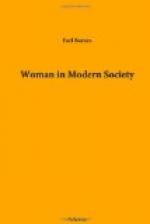To-day men and women are confronted by two tempters which constantly lure them away from the complete living of the family; one is work, and the other is comfort. With the majority of people in our modern industrial democracies work uses up the hours and the energy of life. We have passed into a time when our habitual material needs are great, and the products of work are shamelessly diverted to the excessive uses of comparatively few individuals and groups. Hence millions of workers march along the narrow dark roads that lead through factories and farms to the grave. Only little patches of their nervous systems are ever used, but all their energy flows through these sections day after day, leaving their lives dull and empty.
Marriage for these workers means decreased earning power for the woman, with increased needs for the family, especially when the children come. As one watches the procession of young factory and shop women, with Sunday finery and some leisure, passing over into draggled factory mothers, with no finery and no leisure, one marvels at the strength of the forces with which nature drives them to their destiny. And yet, even with these hopeless workers, marriage and children mark the heights of life.
With others, who are economically freer, work has become an obsession. A Charles Darwin or a Herbert Spencer turns all of life’s forces to shaping facts into science; our industrial leaders mint their hours into dollars; our reformers give up their lives that social conditions may be changed; our society leaders trade life for triumphs. Meantime we all know, or would know if we stopped to consider, that we are here to live life fully and significantly day by day. But domesticity takes time and effort, and so the hurrying specialist follows the narrow line of success until he or she becomes a machine for manufacturing generalizations, for painting pictures, for performing surgical operations or for merely getting money. The richest woman in America said with approval recently that her son was too busy to fall in love.
As industry drives the mass of workers and specialists away from life’s deepest realizations, so the desire to become comfortable, physically and mentally, through avoiding the deeper experiences of life, robs many of those who have a large measure of economic freedom. In all periods of great wealth this disease of ease has afflicted mankind. Life more abundantly comes only at the price of vigorous living; and love travels always in company with anxiety. It would be well, says Cicero, to have children, were it not for the fear of losing them. Let a man apply this principle to wife, friends, possessions and enthusiasm in general and life sinks into utter worthlessness.




